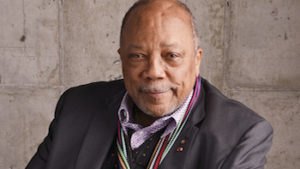
Quincy Jones
*Quincy Jones was born on this date in 1933. He was a Black musician, composer, producer, and arranger.
Quincy Delight Jones, Jr., was born on Chicago's South Side. When he was ten, he moved, with his father and stepmother, to Bremerton, Washington, a suburb of Seattle. He first fell in love with music when he was in elementary school. He tried nearly all the instruments in his school band before settling on the trumpet. While barely in his teens, Jones made friends with a local singer-pianist, Ray Charles. The two formed a combo, eventually landing small club and wedding gigs. At 18, Jones won a scholarship to Berklee College of Music in Boston but dropped out abruptly when he received an offer to go on the road with bandleader Lionel Hampton. The job with Hampton led to work as a freelance arranger.
Jones moved to New York City, where, throughout the 1950s, he wrote charts for Tommy Dorsey, Gene Krupa, Sarah Vaughan, Count Basie, Duke Ellington, Dinah Washington, Cannonball Adderley, and Ray Charles. In 1956, he was performing as a trumpeter and music director with the Dizzy Gillespie band on a State Department-sponsored tour of the Middle East and South America. Shortly after his return, he recorded his first albums as a bandleader for ABC Paramount Records.
1957, Jones moved to Paris to study composition with Nadia Boulanger and Olivier Messiaen. He also worked as music director for Barclay Disques, a French distributor of Mercury Records. As musical director of Harold Arlen's jazz musical Free and Easy, Jones toured Europe, closing in Paris in 1960. Jones formed his big band, which consisted of musicians from the Arlen show, 18 players, and their families. European and American concerts met enthusiastic audiences and great reviews, yet could not support a band of this size, and it dissolved.
After a personal loan from Mercury Records head Irving Green, Jones worked in New York as music director for the label. In 1964, he became vice president of Mercury Records, the first Black to hold such an executive position in a white-owned record company. That same year, Jones began working on film scores. With director Sidney Lumet, he composed the music for The Pawnbroker. It was the first of his 33 significant motion picture scores. Jones left Mercury Records and moved to Los Angeles. After his score for The Slender Thread, he was in constant demand as a composer. His film credits in the next five years included Walk Don't Run, In Cold Blood, In the Heat of the Night, A Dandy in Aspic, MacKenna's Gold, Bob and Carol, and Ted and Alice, The Lost Man, Cactus Flower, and The Getaway.
For television, Jones wrote the theme music for Ironside, Sanford and Son, and The Bill Cosby Show. In the 1960s and '70s, he was a major supporter of Dr. Martin Luther King, Jr.'s Operation Breadbasket. After Dr. King's death, Jones served on the board of Rev. Jesse Jackson's People United to Save Humanity (PUSH).
Jones also helped form IBAM (the Institute for Black American Music). He is also one of the founders of the annual Black Arts Festival in Chicago. In 1973, Jones co-produced the CBS television special Duke Ellington, We Love You Madly, leading the orchestra. From 1969 to 1981, he recorded a series of Grammy-winning albums. These included Walking in Space, Gula Materi, Smackwater Jack, and Ndeda. 1973's You've Got It Bad, Girl (marking his recording debut as a singer). He also arranged music for the 1978 movie "The Wiz."
In August 1974, Jones suffered a near-fatal cerebral aneurysm. After two operations and six months of recuperation, the albums Mellow Madness, I Heard That, and the Dude were created. Jones returned to the studio to produce Michael Jackson's first solo album, Off the Wall. They teamed again in 1982 to make Thriller. His debut as a filmmaker occurred in 1985 when he co-produced Steven Spielberg's adaptation of Alice Walker's The Color Purple.
In 1993, Quincy Jones and David Salzman staged the concert spectacular "An American Reunion" to celebrate President Bill Clinton's inauguration. They soon formed a permanent partnership called Quincy Jones/David Salzman Entertainment (QDE). The company, in which Jones serves as co-CEO and chairman, encompasses multi-media programming for current and future technologies, including theatrical motion pictures and television. QDE also publishes Vibe magazine and produced the TV series Fresh Prince of Bel Air.
At the same time, Jones runs his record label, Qwest Records, and is chairman and CEO of Qwest Broadcasting, one of the largest minority-owned broadcasting companies in the United States. Quincy Jones, the all-time most nominated Grammy artist with 76 nominations and 26 awards, has also received an Emmy Award, seven Oscar nominations, and the Academy of Motion Picture Arts and Sciences Jean Hersholt Humanitarian Award. His life and career were chronicled in 1990 in the critically acclaimed Film Listen Up: The Lives of Quincy Jones.
Jones has been married three times and has seven children with five women. Rashida Jones is his oldest daughter. On June 25, 2019, The New York Times Magazine listed Quincy Jones among hundreds of artists whose material was reportedly destroyed in the 2008 Universal fire.
Widely considered one of the most influential forces in modern American music, Jones died on November 3, 2024, surrounded by his children, siblings, and close family, according to his publicist Arnold Robinson. He was 91. No cause of death was disclosed.
ASCAP Biographical Dictionary
R. R. Bowker Co., Copyright 1980
ISBN 0-8351-1283-1